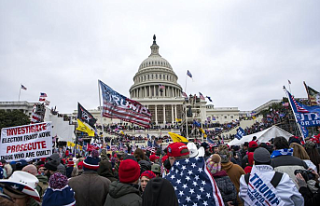On Jan. 6, the leaders of the U.S. Capitol Police were fired after being criticised for intelligence and other failings that made the legislative branch more vulnerable to the attack. The agency, which was once obscure outside Washington, has seen a 15% increase in funding. There is also a greater awareness of the agency's role in the network of organizations that protect the region.
There is concern that the Capitol Police will be able to stop another attack, despite the deepening political divide in the country and unprecedented threats to lawmakers. Experts say that the insurrection's shock has led to necessary changes, such as better communication between the Capitol Police and other law enforcement agencies, as well as improved communication with the public.
Chuck Wexler, head of the Police Executive Research Forum which focuses on professionalism and policing, said that "It's an enormous change in how the Capitol Police think, and operate" this year. They're going be too prepared and will be criticized for it.
Yogananda Pittman, the then-acting Chief of Police, admitted to Congress that rioters were able to storm the building because of multiple failures. She disputed the idea that law enforcement failed to respond to the threat seriously. She pointed out that Capitol Police had issued an internal warning document warning of extremist violence just days before the riot.
Numerous intelligence documents were compiled by the police department, which suggested that the crowd could become violent and even target Congress. The Associated Press obtained intelligence documents that warned of large crowds and included members of extremist groups such as the Proud Boys.
The Capitol Police Board oversees the force. It is made up of the House and Senate sergeants at-arms, as well as the architect of Capitol who oversees the building. In its search for a permanent chief, it passed Pittman aside and selected J. Thomas Manger in July. He was the former chief of police departments in Fairfax County (Virginia) and Montgomery County (Maryland).
Manger has made major changes to the agency which employs nearly 400 civilian employees and 1,800 sworn officers. He has ordered new equipment for the front-line officers as well as officers assigned to civil disturbance units. Additionally, he has expanded training sessions with other agencies and the National Guard. He has also advocated for better peer support and mental healthcare services for officers.
"I believe that Jan. 6's damage was more than just to the Capitol. "It was not only the harm, injuries, and deaths that occurred to men and women from the Capitol Police Department, as well as the protestors, that happened that day," Manger stated in an interview with AP in September. "The damage was more than that. It did more damage than that.
Capitol Police claims that they have improved the process by which investigators gather, analyze, and disseminate intelligence. They have also hired someone to plan major events, with a focus on intelligence coordination and coordination. Capitol Police has begun to hold planning sessions and exercises in advance of major events, and is now briefing officers personally.
Many department officers had criticised their leaders, claiming they failed to recognize the danger ahead of the insurrection. They also didn't do enough for staffing. Some officers were equipped with equipment to protest rather than for riot.
Even with the new chief and significant changes in operations, there are still questions about whether or not the Capitol is sufficiently protected. Many, inside and out, were shocked by the attack on the Capitol last January. However, some warned the intelligence community not to ignore planned rallies by pro Trump entities.
Capitol Riots One year Later
Senator Mark Warner, D. Virginia, is the chair of the Senate intelligence committee. He said that he had called the FBI for several days prior to the attack, and was assured that officials were ready. As he was making his way to the Senate for the certification of Democrat Joe Biden’s electoral votes, he noticed the protestors coming up the hill through Capitol windows.
Warner said that he has been living in Washington for many years and had never seen protestors so close to the building. He said that the next events were chaotic, "ad-hoc" and a embarrassment of response.
According to the Capitol Police watchdog, only a few of his recommendations for making the Capitol complex safe and secure have been implemented. He also said that there were systemic problems after the insurrection.
According to Inspector General Michael Bolton, "The Department still has an overall training infrastructure that meets the needs of department, the level intelligence gathering and expertise required, and an overall culture change required to transform the department into protective agency rather than a traditional police force," Bolton stated to the Senate Rules Committee.
According to police, they are focused on "completing recommendations that could help prevent another assault" and have detailed plans in order to address the dozens if not all of the recommendations made by the inspector general.
The most urgent problem facing the force is the staffing shortage. Manger intends to hire approximately 400 officers, while officials plan to add about 280 sworn officers to the force this year.
The agency released a statement saying that the United States Capitol Police was stronger than before January 6. "We are extremely proud of the hard work that our dedicated employees did during this difficult year.












